“Living as happy neighbours is really a matter of choice”.
KAMRAN REHMAT, 39, is a seasoned Pakistani journalist, who has worked with distinction in both the print and electronic media for nearly two decades. He did his majors in Political Science from the University of Punjab in Pakistan.
His father was born in District Kangra (Himachal Pradesh) and only left India following the Partition on the last train to Pakistan.
Kamran was born in Islamabad but after spending more than half his life abroad returned home in 2005 “to partake the media boom in Pakistan” as he calls it. In 2006, he became one of the youngest editors of a mainstream daily in Pakistan at 36.
As Editor of The News, Pakistan’s largest circulated English daily, at its Rawalpindi station, he won critical acclaim for heralding new trends in his country by pitching for human rights stories on the front page as well as setting a bold agenda for news coverage that was complemented by visual appeal and catchy headlines.
In 2007, he switched to mainstream television and was a pioneering member of Pakistan’s first English language television channel, Dawn News. He enjoyed a central position as News Editor despite being stationed in Islamabad — away from the TV channel’s headquarters in Karachi.During a rewarding career, Kamran has served in leading editorial positions in both the print and electronic media, at home and abroad. He served as News Editor at Times of Oman in Muscat for eight years from 1997-2005.
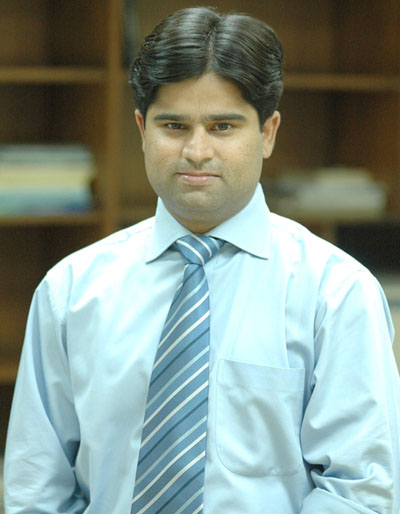
Kamran posing for Speakbindas
Kamran is also credited with a valuable stint in advertising and doing his own radio show — See Pakistan — a tourist guide on Radio Pakistan in the mid-Nineties.
In the late Nineties, he became the Associate Editor of Sportsweek, Pakistan’s first sports weekly, edited by renowned cricket commentator Omar Kureishi. He also wrote for veteran Indian journalist Ayaz Memon’s magazine CricketTalk.
But much of his acclaim stems from lucid columns and insightful analysis, which have appeared in all the leading newspapers of Pakistan over a period of time and a slew of foreign publications as well. He is also a guest analyst for Al Jazeera online.
An avowed peacenik, he writes with passion on the subject of India-Pakistan relations although he does not restrict himself to only politics. From the art of ghazal to the nuances of cricket captaincy, he has stamped his authority effortlessly on an endless stream of subjects.He won his first award for writing a maiden account of the AIDS situation in Pakistan when very few even knew about the subject in 1993. In 1996, his daring account of the disappearance of a family in the heart of Islamabad drew the intervention of Amnesty International. More recently, he was writing with a flourish on Islamabad’s city life in Dawn, Pakistan’s leading English daily.
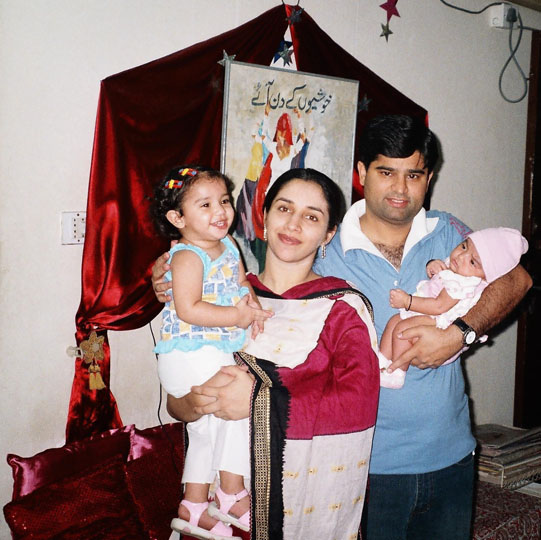
Kamran with his wife and kids
Speakbindas caught up with Kamran recently for a snap interview.
Speakbindas: How would you describe your journey thus far — from print media to its electronic cousin?
Kamran: It has been a rewarding experience. Suffice it to say, I would not exchange it for any other profession. I joined the field when still a collegiate and I doubt very much if I would be able to let go off it should I have to make a choice per force.
Speakbindas: How is electronic media different from print and what would you pick given a choice?
Kamran: There is no difference in terms of the basic nature of the job, which is to provide information but there is a vast gap in terms of content and style. TV, as you know is about basically, providing news on the go — mostly in real time — so, in addition, to a sound grasp of news and current affairs, you have to be on your toes. To describe it in one word — alacrity. In print media, you have quite a bit of time to develop and harness your story. On a news channel, that is a luxury you can’t afford.
About my choice? Well, that’s a tough one. I’m in love with the fine print and that is backed by a combination of thousands of stories, articles, features, analysis, interviews and opinion pieces I have done over the years. But as opposed to my love interest, I feel a greater rush for doing things in real time, especially when deadlines are challenging.
Speakbindas: Pakistan is deemed to be one of the hardest places to report. How do you manage to tip the scales?
Kamran: You are right, Pakistan puts all your grey cells to work. Venturing into some zones can be dangerous but that hasn’t ever stopped folks this side of the Indus from trying to scoop up the impossible. It is a tribute to their skill and never-say-die mien that, despite all odds, Pakistan boasts the freest media in Asia by a stretch and in recent years, it has come to be regarded by powers-that-be, who would dearly want to weaken it for selfish reasons, as the last frontier!
It braved military dictators before but the cataclysmic shift it rung by outliving former strongman Musharraf’s diabolical attempts to stifle it is a chapter Pakistan’s future generations will be proud of.
Speakbindas: What has been the single defining achievement of your career so far?
Kamran: To be honest, I’ve had a few bouquets from the time I ventured into this minefield but those are individual feats — like being one of the youngest editors of a mainstream daily in Pakistan and creating a record for the most weekly columns without a break for five years for a foreign publication, but what humbles me most is the contribution I have been able to make in terms of putting human rights issues on the front page.
About four years ago, I was instrumental in shaping public opinion and then forcing the hand of both the Indian and Pakistani governments to have hundreds of prisoners — in most cases languishing for decades without recourse to justice — being freed on both sides of the border.
I had a hard time convincing my superiors to take up the case of the Indian prisoners — because I genuinely felt it was a humanitarian question — apart from those of our own. Initially, they were reluctant but when merely responding to the patriotic urge did not bear fruit, they followed my idea of raising the bar.
Before we knew it, it raised a commotion in India, which propelled the issue to the centre stage and soon enough it was the first item on the agenda of Foreign Secretaries level talks.
A few weeks later, hundreds of prisoners were released, and I remember the-then Indian High Commissioner Shivshankar Menon congratulating us on what he described as “changing the course of history”.
Speakbindas: There was a lot of criticism following the Mumbai attacks that media in India and Pakistan were pandering to jingoism. What is your take on the issue?
Kamran: Yes, I would largely agree with that description but to be brutally honest, I felt it began when an understandably, outraged Indian media quickly resorted to its standard refrain — blaming Pakistan. For three days, the Pakistani media carried the burden of guarded responsibility but when the government in Islamabad panicked and offered to send the ISI chief to India without any evidence of involvement, the Pakistani media swung back into “national interest” mode. But two wrongs of course, never made a right.
As it is, we have a long trust deficit and the media can do better than to play along those lines and accentuate the myriad of problems confronting the two nations.
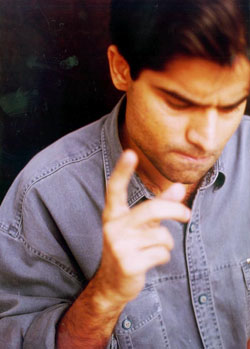
A leaf from a late 90s album
Speakbindas: Let us in on a few interesting anecdotes from your time in journalism.
Kamran: There are too many to list, some of which cannot even be reproduced here. May be some day, these will feature in a memoir! Immediately, I can recollect interviewing the Norwegian prime minister in Oslo and tete-a-tete with artistes like Adnan Sami Khan, Naseeruddin Shah and Ghulam Ali in Muscat of all places.
I forgot to bring a tie with me to Oslo in 2005 and so I had to purchase an expensive one in a downtown joint. I miscalculated the currency and happily bought one thinking it had cost me five hundred rupees or so but it turned out that I had paid more than five thousand rupees for it!
In hindsight, I might as well have not spent anything to tie myself a knot since the Norwegian PM was a down-to-earth gentleman, who I was able to meet without a single guard or obtrusive checks five minutes from the time I arrived at his unbelievably simple office on the sixth or seventh floor of what looked like a mall!
A tete-e-tete with Adnan Sami was insightful and one was amazed at his brilliant musical prowess (he’s the fastest keyboard player in the world, for instance). But I managed to ruffle him with questions about his nationality — a subject of great public interest — and it almost broke the last straw on the camel’s back.
Talking to Naseeruddin Shah and ghazal maestro Ghulam Ali was like earning an education. Shah told me how he refused the role later taken by Sunil Shetty in Main Hoon Na because it required him to badmouth Pakistan.
Ali took time out from his busy schedule to enlighten me with the nuances of ghazal. He sang from Mirza Ghalib’s verses to bring home the lesson.
Speakbindas: In conclusion, what message would you like to give your friends in India?
Kamran: Just that I wished we didn’t have to believe in borders. It has been said before and I’ll say it again. We can’t choose our neighbours. We have to live with them. So why not live peacefully and in a happy communion. It is really a matter of choice if we care to note.
I’m just a drop in the ocean but I’d like to believe I did begin charity at home — by overlooking the pangs of Partition visited upon my father’s family and giving my firstborn a name that has its origins in India but applies equally to the Pakistani culture: Suhani, meaning pleasant.
At my end, it was a small tribute to the many unsung heroes and heroines on both sides of the divide and countless others of their Diaspora, who have burnt midnight oil — sometimes in the face of screaming odds — to bring peace to our two great countries.

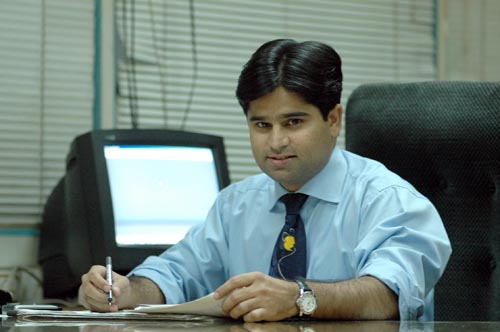
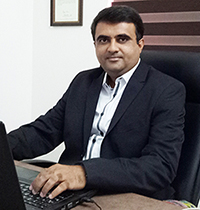
I agree absolutely that India and Pakistan should find ways of being good – peaceful – neighbours. Knowing our politicians, I think they will really need to be pushed by their citizens. Citizens such as Kamran Rehmat. I hope he – and others on both countries – continue to speak out in favour of peace.
i always knew kamran had it in him to do justice to any story. though i have lost track of his life and his professional career since he left muscat, his progress doesnt surprise. he packs power and determination in his stories, makiing even the most serious political stories highly readable. kudos to him for all that he has achieved in such a short span of time. keep those pennants flying high, Kamran
Well Kamran,
Weldon, I know you are professional journalist. I want to add “Brevity is the wit of soul” you have followed always in journalism that is why you found the way towards the destiny.